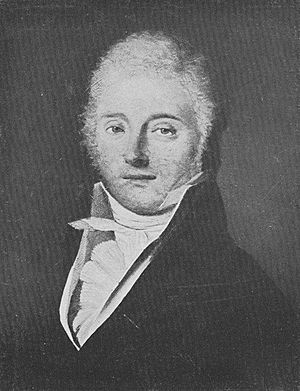Félix Desportes facts for kids
Félix Desportes (born August 5, 1763 – died August 28, 1849) was an important French politician. He was the very first mayor of Montmarte. He also worked as a secretary for Lucien Bonaparte. Later, he became a Prefect in the Haut-Rhin region of France.
Desportes helped with important diplomatic tasks during the time of the French Revolution. He played a big part in Geneva becoming part of France again. During the time of Napoleon's rule, he was made a Baron. He was also elected to the House of Representatives. After some political changes, he had to leave France for a while. He stopped his political work after 1830.
Contents
Early Life and Education
Nicholas Félix Desportes was born on August 5, 1763, in Rouen, France. His father, Jacques-Félix Desportes, was a successful merchant. Félix was also related to the famous poet Philippe Desportes.
He went to military school in Gonesse. Later, he studied law at the college of Lisieux in Paris. He also trained to become a notary in Paris.
Political Career and Public Service
On May 22, 1790, during the French Revolution, Félix Desportes became the first mayor of Montmartre. Starting in 1791, he took on important diplomatic jobs in Switzerland.
He was supported by Georges Jacques Danton, a key figure in the Revolution. Desportes was arrested on April 23, 1794. However, he was saved by a political event called the Thermidorian Reaction. He was living in Geneva when he was called back to France in 1795.
France was expanding its territory, which led to Geneva joining France. Desportes worked as a commissioner in the department of Léman from May to August 1798.
In 1800, he became the secretary general for the Ministry of the Interior. This happened under Lucien Bonaparte, who was a close friend. From April to October 1800, he was also the first secretary at the French embassy in Spain. Both Desportes and Bonaparte benefited from the Treaty of Badajoz (1801).
Lucien Bonaparte had a disagreement with his brother Napoleon. Because of this, Napoleon sent Desportes to work as a prefect. On July 8, 1802, Desportes became the prefect of Haut-Rhin. He held this important position for thirteen years.
He was given the title of Baron of the Empire on February 25, 1809. He also became a member of the Legion of Honour. He was removed from his prefect position in December 1812.
Desportes had become quite wealthy from his properties in Pulversheim and a hotel in Paris. He served in the National Guard in Paris. He was an aide-de-camp to the general-in-chief of the guard. On July 15, 1814, he met with Benjamin Constant.
He was elected to the French government during the French Government of the Hundred Days on May 13, 1815. After the Second Restoration, he was arrested on August 1, 1815. He was held in prison. He helped negotiate the Peace of Basel.
He was told to give up his properties in Haut-Rhin. He was also banned from that area. From 1816 to 1820, he found safety in German cities like Landau, Mainz, Wiesbaden, Frankfurt, and Hesse-Darmstadt.
In 1820, he was allowed to return to France. He discussed his past work as a prefect in Haut-Rhin. He was seen as a leader of the liberal party, along with Jacques Koechlin and Voyer d'Argenson.
From 1825 to 1834, he continued to follow his revolutionary beliefs. He tried to get public jobs. In 1827, he attended a liberal gathering in Colmar. However, the Bourbons did not support him because of his past actions during the Revolution. This kept him from getting public positions.
Family Life
Félix Desportes married Victoire Berryer on May 5, 1788. She was a wealthy heiress and known for her beauty in Paris. They had four children: Lucile, Flore-Pierrette, Louis-Benjamin-Félix, and Victor.
Flore-Pierrette married Baron de Boucheporn. Victor studied at the University of Gœttingue.
Lucile, one of his daughters, faced challenges. She later had a daughter named Henriette Deluzy-Desportes, born in 1813. Félix Desportes provided some financial support for Lucile. Lucile worked hard to pay for Henriette's education. Lucile passed away in 1832. Henriette was then cared for by Félix's brother, Benjamin Desportes. She received money to finish her education and went to England to learn English.
Later Years and Passing
Starting in 1830, Félix Desportes lost a lot of his money. A notary ran away with a large part of his fortune. Also, a trading company where he had invested went out of business.
He could no longer consistently support his daughter Lucile. He used his connections to get a retirement pension for his work as a prefect, which he started receiving in 1834.
Félix Desportes passed away on August 28, 1849, in Montmartre, Paris. He and his brother Benjamin are buried at the Calvaire Cemetery in Montmartre.
 | Misty Copeland |
 | Raven Wilkinson |
 | Debra Austin |
 | Aesha Ash |


